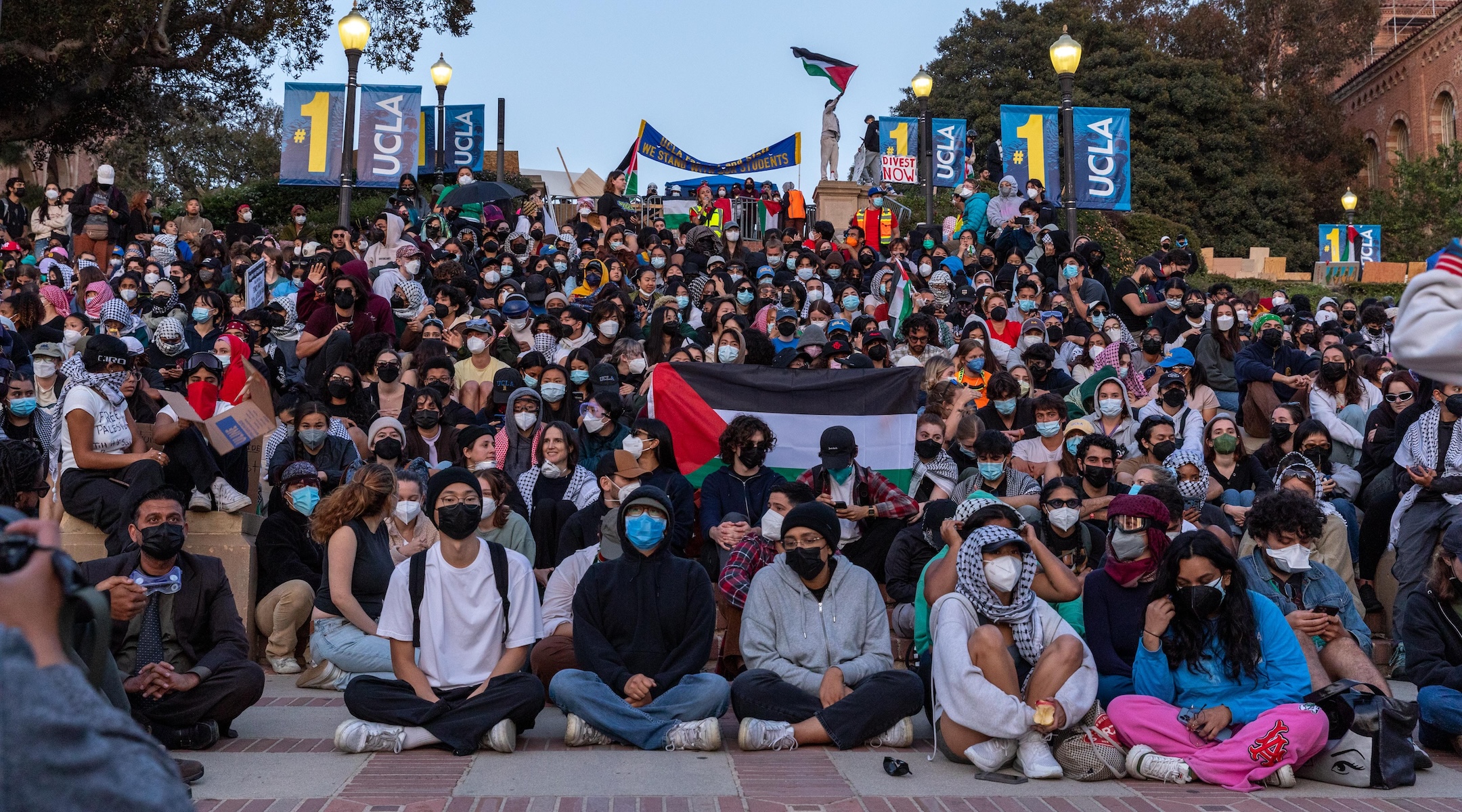Department of Ed resolves Title VI antisemitism complaints against 5 U of California campuses, U of Cincinnati
The civil rights agreements come as Donald Trump has suggested eliminating the Education Department, which could transfer responsibility for Title VI

Pro-Palestinian students at UCLA campus set up encampment in support of Gaza and protest the Israeli attacks in Los Angeles, California, May 1, 2024. (Grace Yoon/Anadolu via Getty Images)
(JTA) — The U.S. Department of Education announced it had resolved nine antisemitism- and Islamophobia-related civil rights complaints made against five campuses inside the University of California system on Friday, including some involving a prominent pro-Palestinian encampment in Los Angeles that had descended into violence in the spring.
The sweeping resolution comes in the final weeks of President Biden’s term, and as President-elect Donald Trump has threatened to eliminate the department altogether, which could potentially move antisemitism investigations under Title VI of the Civil Rights Act to the Justice Department.
The Education Department’s Office of Civil Rights, which handles Title VI cases, wrote in an open letter to Michael Drake, president of the UC system, that it had “identified compliance concerns that the Universities appear not to have responded promptly or effectively” to allegations of harassment. In addition, OCR said, three of the schools “appear to have engaged in different treatment of students based on actual or perceived national origin.”
Four of the resolved cases involved the University of California, Los Angeles, where an unruly spring encampment — and pro-Israel counterdemonstrations — ended in violence and arrests. UCLA received complaints on behalf of both Jewish and pro-Palestinian students that the school had failed to protect them during the encampments, which also recently earned the campus a legal rebuke based on accusations that protesters blocked Jewish students’ access to parts of campus. (An internal antisemitism task force at UCLA also recently found that the school had fostered an antisemitic environment, including as a result of the encampments.)
Two more complaints involved UC Davis, where a faculty member in October 2023 posted threats to “Zionist journalists” on social media, and where Muslim and Palestinian students alleged they had been doxxed and stalked.
The other three cases involved the targeting of a Jewish student body president at UC Santa Barbara; allegations of “anti-Zionist propaganda” posted in the Critical Race and Ethnic Studies department of UC Santa Cruz; and UC San Diego’s alleged failure to respond to harmful activity from its Students for Justice in Palestine chapter.
In a statement to the Jewish Telegraphic Agency, the UC system said it was “pleased” with the resolution agreement and that it “unequivocally rejects anti-Semitism, Islamophobia, and all forms of harassment and discrimination.” The statement pointed to other steps the school said it had taken lately to address the issue, including establishing its own office of civil rights, an anti-discrimination policy, and new limits on protests and other activities.
As part of the resolution agreement, the UC system agreed to annual Title VI training for staff and campus police, to report more information to OCR about how its campuses will respond to harassment complaints, and annual audits and regular campus climate assessments for the five campuses mentioned in the complaint.
Six of the nine complaints involved harassment against Jewish and Israeli students; OCR said it dismissed one of those complaints, involving a Jewish UCLA student who said SJP had blocked her from joining the group, due to lack of evidence. The other three complaints involved harassment against Muslim, Arab or Palestinian students.
Justin Samuels, a non-Jewish conservative legal activist whose complaint triggered one of the UC Davis investigations, told JTA he was “happy to have helped” in their resolution. Samuels has been active in filing Title VI complaints related to campus antisemitism in the wake of the Oct. 7, 2023, Hamas attacks.
He added, “I expect the Trump administration to be a lot more proactive on shared ancestry discrimination.”
OCR has continued to resolve antisemitism-related Title VI cases since the election, though dozens more remain active in its system. A separate resolution agreement, also announced Friday, ruled that the University of Cincinnati did not appropriately respond to complaints of discrimination against Jewish students related to a “Spooky Zionist” student gathering.
The university similarly agreed to regularly report its handling of discrimination cases to the office, and to additional employee training and campus climate assessments.
“The university appeared to operate under the mistaken understanding that if a complainant could not identify a perpetrator by name; the conduct was not directed at a specific individual; the conduct involved multiple perpetrators or a registered student organization; or the conduct occurred off campus, the university did not have an obligation to address alleged harassment,” the office determined in a statement.















